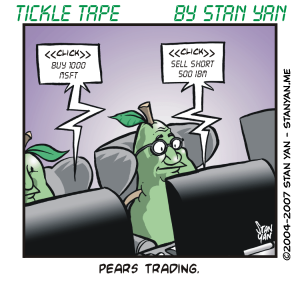Trading is a profession where one must not give up in the face of adversity. “You’ve got to go into the trading day expecting to lose,” is what some seasoned traders warn. It’s not the most optimistic outlook, is it? Trading in today’s market isn’t like trading in the steadily upward trending market of the late 1990s, where even the most inept online investor expected to strike it rich by just purchasing a few hundred shares of almost any company and using a buy-and-hold strategy.
Today’s market requires more skill and persistence. And to make the huge profits, you’ve got to take some risks. And taking risks means you must be ready to face some losses. Even when you control your risk on a given trade (which we strongly advise), you are bound to face loss after loss and watch your account balance diminish. As much as you objectify the loss, and see it as merely percentage points, there’s still part of you that experiences the loss and feels the pain.
At these times, it’s hard to keep going; it’s easy to fall victim to the “why bother” attitude. You may feel you might as well give up. It is at these times, though, when you must be the most persistent. You must believe that you can master the markets and recover from the slump. There’s a right way to go about this and a wrong way to go about this, however. Persistence is a complex issue and an understanding of it will help you approach a setback with the proper mindset.
Motivational theorists argue that people’s expectations of reward or punishment influence whether they will persist or give up. If you believe, for example, that there is no way you’ll make a profit no matter how hard you try, you’ll want to give up. On the other hand, if you believe that success is assured, you will not only persist, you’ll enthusiastically charge ahead in anticipation of a reward. But it doesn’t take much trading experience to realize that trading isn’t an activity where success is assured.
Novice traders who open an online investing account are very enthusiastic. They tend to believe that trading is “easy money,” but they soon face the harsh reality that market conditions change, and what worked in one market fails in another. Losses are the rule rather than the exception, history only repeats itself when it does, so-called conventional wisdom is right only when it is right, and no trading strategy is foolproof.
From a purely motivational point of view, if one believes that trading is easy, that he or she is skilled at it, and that success is assured, he or she will persist. Such thinking exemplifies the overconfident investor. In some ways, it is easy to motivate yourself to get out of a slump. Just tell yourself you are the “greatest trader in the world,” convince yourself that your talents are boundless, and positively think, “If I just apply myself, I’ll be a success.”
That strategy works for about three trades at best, if you are lucky. Then, reality sets in and you realize that shallow, unrealistic optimism is more detrimental than helpful in the long run.
It’s more useful to study your reasoning more closely. When one is in a slump and feeling stuck and disappointed, he or she tends to think, “I’ll never be profitable, and there is nothing I can do about it.” The consequences of such reasoning are that you’ll never feel like putting on a trade ever again. It is better to think, “Profitable trading is almost impossible, but I can learn how the markets work, develop the requisite skills, and eventually achieve consistent profitability.”
Granted, this isn’t the most optimistic way to look at trading, but it does hold some realism. It isn’t overly optimistic. Profitable trading is “almost” impossible. The keyword here is “almost.” It is vital to acknowledge that trading is a challenge that few seem to master. By acknowledging the difficulty, you are looking at the world realistically and will be able to handle setbacks more easily. If you aren’t expecting very much in the first place, your hopes won’t be easily dashed when you face a setback.
The second key issue is the need to develop requisite trading skills. Here’s where realistic optimism comes in. We know for a fact that there are traders who have developed trading skills and have realized success. It is realistic to hold this belief and it is realistic to believe that if you put in the time and effort, and get the proper amount of training, you can achieve profitability also.
Holding such an attitude is optimal. It addresses the limitations of trading, but it also offers hope. So when you are ready to throw in the towel and give up, cultivate an optimistic yet realistic attitude: One can achieve success as a trader through hard work, extensive experience, and persistence. By keeping this in mind, you’ll gladly work tirelessly until you achieve the consistent profitability you have been striving for.


